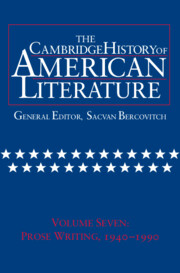Book contents
- Frontmatter
- Introduction
- The Drama, 1940—1990
- 1 Introduction
- 2 Tennessee Williams
- 3 Arthur Miller
- 4 Edward Albee
- 5 Sam Shepard
- 6 David Mamet
- 7 Changing America: A Changing Drama?
- Fiction and Society, 1940–1970
- After the Southern Renascence
- Postmodern Fictions, 1960–1990
- Emergent Literatures
- Appendix: Biographies
- Chronology, 1940–1990
- Bibliography
- Index
7 - Changing America: A Changing Drama?
from The Drama, 1940—1990
Published online by Cambridge University Press: 28 March 2008
- Frontmatter
- Introduction
- The Drama, 1940—1990
- 1 Introduction
- 2 Tennessee Williams
- 3 Arthur Miller
- 4 Edward Albee
- 5 Sam Shepard
- 6 David Mamet
- 7 Changing America: A Changing Drama?
- Fiction and Society, 1940–1970
- After the Southern Renascence
- Postmodern Fictions, 1960–1990
- Emergent Literatures
- Appendix: Biographies
- Chronology, 1940–1990
- Bibliography
- Index
Summary
In the 1960s, change was an imperative. Signaled politically by a generational shift, it was reflected socially in an economically empowered youth movement whose spending power began to shape popular culture. The civil rights movement, kick-started in the late 1950s, now became the principal domestic issue, while the Vietnam War provoked a resistance that politicized a generation. Authority was challenged; formal structures were questioned. Politics became street theater, a series of publicly enacted gestures. Individuals underlined the integrity of their beliefs by physical presence and dramatized their faith by offering to levitate the Pentagon or place their bodies in front of munition trains as a symbol of the body’s vulnerability to the military machine as well as a pragmatic strategy of resistance. The body, indeed, became an expressive force, sexually liberated by the birth control pill, publicly deployed as a provocation to a society presumed to be simultaneously puritanical, materialistic, and aggressively technological. This was life lived metaphorically, and, perhaps logically, the theater, which deploys the body as a primary instrument of signification and works through metaphor, became a focus and means of revolt.
For those committed to transformation – personal, social, political – where more natural to turn than to a form in which transformation was of the essence? In an age of performed gestures and specially staged events, the theater had a persuasive symbolic force. In a period in which the slave was shown transmuting into the rebel, the self being reborn, and history being restaged as paranoid vision, the theater seemed to offer itself as paradigm.
- Type
- Chapter
- Information
- The Cambridge History of American Literature , pp. 76 - 100Publisher: Cambridge University PressPrint publication year: 1999

